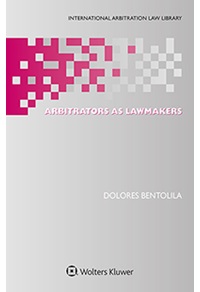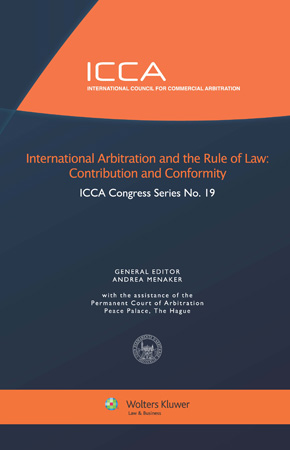Peter Plachy
The new Slovak Arbitration Act (“SAA”) was adopted by the Parliament (Act. No. 336/2014 Coll.), and is in force as of January 1, 2015. In order to see whether the SAA will promote Slovakia as an arbitration venue, main novelties and amendments brought by this new act are analysed in this blog entry.
Arbitrability: Under the old law, parties were allowed to arbitrate disputes, which were subject to settlement in courts under art. 99 of the Slovak Code on Civil Procedure. The amendment provides under art. 1(2) that arbitrable disputes are those, which are related to legal relations and “can be settled by an agreement of the parties [under art. 585 of the Slovak Civil Code (“SCC”)] including disputes regarding the declaration whether there is a right or a legal relation or not”. The second part of the definition, related to the validity of legal acts, was prompted by several Slovak court decisions, which held that parties to an arbitration agreement cannot apply for a declaratory relief regarding the validity of the arbitration agreement to an arbitral tribunal (Case No. 26 Cob 161/2009 of 21 December 2009, Regional Court of Nitra and 2 Cob 178/2008 of 18 December 2008, Regional Court of Bratislava). It was held that a civil court must, in turn, decide such a question. These decisions were in a direct conflict with the Kompetenz-Kompetenz doctrine, incorporated in art. 21(1) of the SAA, which explicitly states that the tribunals have the capacity to decide upon the validity of arbitration clauses. The clarification in the new SAA is thus welcomed, but the decisions of the Slovak courts will need to be tested against this amendment.
Moreover, one of the main changes in the Slovak arbitration regime is the exclusion of consumer disputes from the application of the SAA. For this purpose a brand new Act. No. 335/2014 Coll., which focuses exclusively on consumer disputes, was adopted.
Permanent Courts of Arbitration: Under art. 12 of the SAA, Permanent Courts of Arbitration (“PCAs”) may only be established by a civil association (under Act. No. 83/1990 Coll.), an association of legal entities under the SCC and by chambers of commerce. This change aims to dissuade regular corporations from establishing PCAs for profit, and in turn ensures independent arbitral awards. The existing PCAs must have complied with this change within three months after the SAA came into force.
The regime of the PCAs in Slovakia was (and still remains) the most glaring problem of the legislation. The old law led to the establishment of more than 170 PCAs because their constitution was not regulated at all. The change of the SAA, in all fairness, seems only to partially address this issue. A the same time, the Czech Arbitration Act (Act No. 216/1994 Coll.) allows only the existence of arbitral institutions established by law, and the Czech Chamber of Commerce enjoys a significant amount of arbitrations in the Czech Republic. Nevertheless, it is worth to wait and see whether the SAA is to provide a ground for the establishment of a reliable institution in Slovakia.
Arbitration Clause: In this matter, the SAA reflects the decision of the Slovak Supreme Court (2 Cdo 245/2010 of 30 November 2011, Slovak Supreme Court), which was later followed by lower courts and which stated that the requirement of a “written” arbitration clause is a more formal requirement than the one contained in the SCC. More specifically, the Supreme Court held that an arbitration agreement incorporated by reference into a loan agreement between a bank and its corporate client was invalid due to lack of written form. Consequently, the SAA now explicitly states in art. 4(4) that an arbitration clause can be incorporated by reference without a signature on the incorporated document. Addressing the concern of a recent post, this reference does not need to be specific, i.e. it can be general. Additionally, under a new provision of art. 4(7) of the SAA, the Slovak legislator has finally expressly adopted a practice of considering a valid arbitration clause to be constituted when respondent submits its first memorandum without objecting to the tribunal’s jurisdiction. This addition should also guide the civil courts away from the overly formalistic approach towards the “written” arbitration clause requirement described above.
Interim Orders: The legislator opted to incorporate an extended version of art. 17 of the UNCITRAL Model Law on interim measures and preliminary orders into the SAA. In line with the model legislation, the arbitral tribunal is now competent to order a party to:
• “provide a means of preserving assets out of which a subsequent award may be satisfied”,
• “maintain or restore the status quo pending determination of the dispute”,
• “take action that would prevent, or refrain from taking action that is likely to cause, current or imminent harm or prejudice to the arbitral process itself” and to
• “preserve evidence that may be relevant and material to the resolution of the dispute”.
Importantly, under art. 22a of the SAA, if the parties agree, an interim order may be rendered even before the arbitral tribunal is constituted and without any submission from the respondent (ex parte). Such an interim order, however, is not enforceable through the courts unlike other interim measures (art. 22c of the SAA). All interim orders are, nevertheless, subject to the review of civil courts pursuant to art. 22d of the SAA.
Annulment of an Arbitral Award: A significant amendment was adopted in art. 40(1) of the SAA which is a verbatim adoption of the grounds for the annulment of an arbitral award from art. 34 of the UNCITRAL Model Law. The reasons now include the ground of public policy pursuant to art. 40(1)(b) in conjunction with art. 50(2) of the SAA, which was not a ground for annulment in the old law. For this reason, there were cases when the Constitutional Court took it upon itself to annul an arbitral award due to lack of the public policy ground for annulment (Case No. III. ÚS 162/2011 of 31 May 2011). The empowerment of the civil courts with this ground is, therefore, welcomed. Additionally, the period for the initiation of the annulment proceedings is prolonged to 60 days (from 30) under art. 41 of the SAA.
The Slovak legislator did not choose to follow the solutions of the French and Belgian arbitration acts according to which the parties can waive their right to seek recourse at the national courts against an arbitral award since this is still prohibited in art. 42 of the SAA. Nevertheless, more efficiency in annulment proceedings is ensured because only three district courts now have the competence to deal with arbitration matters. This was achieved by an accompanying amendment of the Act No. 371/2004 Coll. on courts’ districts.
Conclusion
In conclusion, the SAA is a big step made in the pro-arbitration direction, but a long journey still lies ahead. Art. 43(1) of the SAA still states that if a court annuls an award because the arbitration clause was not valid or due to lack of arbitrability, the court will continue in the proceedings as if the claim was made there originally. Ultimately, there is no reason why a verbatim adoption of the UNCITRAL Model Law would not be more efficient. In fact, that is essentially what happened with the reform of the provisions on interim orders and the grounds for annulment.
More from our authors:
The post The New Slovak Arbitration Act Applicable From January 2015: Has It Progressed Sufficiently? appeared first on Kluwer Arbitration Blog.


